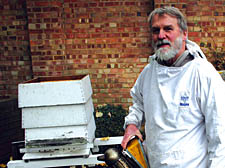|
|
 |
| |

‘Sheriff Beekeeper’ John Hauxwell warns that we may lose our bees forever unless research funding is provided to tackle the mystery disease that wiped out one in three colonies last winter |
Our bees are dropping like flies: but why?
‘Sheriff Beekeeper’ and his deputies take battle for research funding to Downing Street
HE has been stung more than 1,000 times but John Hauxwell doesn’t harbour a grudge against his honey-making friends.
In fact, the retired architect turned “sheriff beekeeper” is more worried about what will happen to them.
Numbers of bees have fallen dramatically and Mr Hauxwell is at a loss to explain why.
“Bees are facing uncertainty,” he said. “There are lots of unknown factors and people haven’t worked out what is going on in the life of bees to cause these losses.”
It might seem like an oldfashioned art but statistics suggest beekeeping is enjoying something of a renaissance.
Just ask the North London Beekeepers’ Association, which has a pile of 60 membership applications queuing up in their offices.
Yet while the numbers of beekeepers are on the increase, the number of bees buzzing around the 100 hives dotted across Camden have taken a dramatic nosedive.
Mr Hauxwell, who lives in Lady Somerset Road, Kentish Town, says so serious is the decline that one in three colonies of bees succumbed to a host of unidentified killers last winter.
Without proper funding to research why their numbers are dropping off, he warned, beekeepers could soon be waving goodbye forever to bees.
And with it a traditional breakfast spread: honey.
Mr Hauxwell says that the £165million generated each year by the bee industry – through honey production and the pollination of crops – more than justifies the £8million beekeepers are asking the government to set aside for research.
Only around £200,000 has currently been set aside.
Tired of being told to buzz off, beekeepers yesterday (Wednesday) went on the offensive.
Wearing their bee-suits, 12 members of the North London branch – alongside hundreds from across the country – marched to Downing Street to hand in a petition with 140,000 signatures calling for a Whitehall rethink on the plight of the bee.
As well as a host of other dangers, Mr Hauxwell says bees are under threat from a parasitic mite – first discovered in England in 1992 – that carries a disease which remains unidentified.
Mr Hauxwell, who now wears a bee suit marked “Sheriff Beekeeper”, first became interested in bees after his son suggested they have a hive in their garden. Twenty years on, Mr Hauxwell’s love affair with one of the country’s most treasured animals is undimmed.
“It’s a fascinating hobby,” he said. “The bees have this communication system, a special dance that they use to tell each other where the nectar is.
“When a bee comes back to the hive it does something called the ‘waggle dance’ which tells them in what direction and how far the nectar is.” |
 |
|
|
 |
| |
| |
|
 |
|